
03 Sep Alumni Spotlight – Dipika Hopkins ’11
Dipika Hopkins ’11 on Climbing, Community, Self-Discovery
Dipika Hopkins ’11 is a passionate rock climber who has been working in the climbing industry in London for the past three years as both a coach and a route setter. What first drew her to climbing was the combination of physical challenge and problem-solving, but it’s the incredible community that has kept her engaged and inspired to pursue a career in the sport. For Dipika, climbing has also been a way to reconnect with nature and the outdoors.
Yati: It’s been a while since you visited Woodstock. Could you share a bit about your visit? What activities or initiatives have been keeping you engaged during your time here?
Dipika: I’ve been back at Woodstock for about a week and a half now. Graduated in 2011, so I hadn’t been back for 13 years. It was quite amazing to see how the school has changed but also how it’s remained the same. As a very passionate rock climber, who also works in the industry, it was amazing to come back to the school and share my love and knowledge of climbing with the students. It’s been very, very rewarding. We have not only climbed indoors and made the most of the wall at the school, but we’ve also been looking at climbing as more than just a sport. We’ve been trying to connect that with art, with movement, with drama, and also with physics. So, it’s been quite interesting for me to look back and reflect upon my own climbing and my own relationship with climbing through a different lens. We’ve also been taking the students out to the Nolte to get them to experience real rock for the first time, and that was quite a rewarding experience as well – to see so many kids outside, climbing for the first time. And also just being out in nature and seeing the spaces that they could explore because of climbing or through climbing.

Yati: How does it feel to be back on campus?
Dipika: It’s been amazing. It’s been really, really good to see the space again. When I walk through Parker Hall, for instance, I’m glad that I got to see it before it gets changed because it’s about to get renovated. When I walk through the Quad, that feels exactly the same. If I’m sitting there with my lunch tray, if I close my eyes, I could be, you know, back being a student again. All the sounds are the same. So that’s been really, really lovely. It’s been kind of funny as well. I almost felt as if I was a student again and being in that environment again. And I think having Miss Priya who’s now at CFI – as she was my dorm parent – to have someone like that who was quite an important figure in my time at Woodstock, to see them again, it’s been incredible.
Yati: What inspired you to pursue rock climbing initially, and how did you transition from it being a hobby to a professional career?
Dipika: The thing about climbers is that they love to talk about it, and they love to inspire other people to get into the sport. That’s kind of how I got into climbing. I had a friend who worked at a climbing wall, and he kept on talking about climbing. He was like, “You have to come, you have to come, you have to come.” And eventually I caved in, and I was like, “Okay, fine, let’s try this.” And immediately I was hooked. I loved the problem solving element of that. I love the community aspect of it. I also love the fact that it’s a really fun way to exercise. I’ve never really been the kind of person to just go and lift weights at the gym. In school and university you have all these opportunities to pursue different sports and take part in those different sports. But as an adult it sort of becomes a bit harder, especially for team sports, and then it’s sort of time restrictive as well because let’s just say they only meet up on a Wednesday evening or something. However, with rock climbing I found that because of the kind of climbing I do – which is bouldering and done without any ropes or harnesses – it also means that I could do it by myself whenever I wanted because climbing gyms are open seven days a week until late. What I love about it is the freedom.
I love the community. I’ve made some very, very good friends because of climbing. And I’ve really valued that. I’ve also traveled a fair bit and lived in different countries. Climbing has been the one way that I get to meet people whenever I go, wherever I go. They’re very, very welcoming as a community. I feel like climbing is a beautiful group of people who become friends because they’re trying to solve this puzzle together and work together. What I love about climbing as a sport is that even if you’re in a competition, it’s never really you against the other person. It’s you against the wall. It’s you against whatever problem there is on the wall. So even in competitions you’ll see all the competitors talking about, “Oh, how did you do this move? And how did you do that?” There’s a real camaraderie in this sport, which is really, really rare.
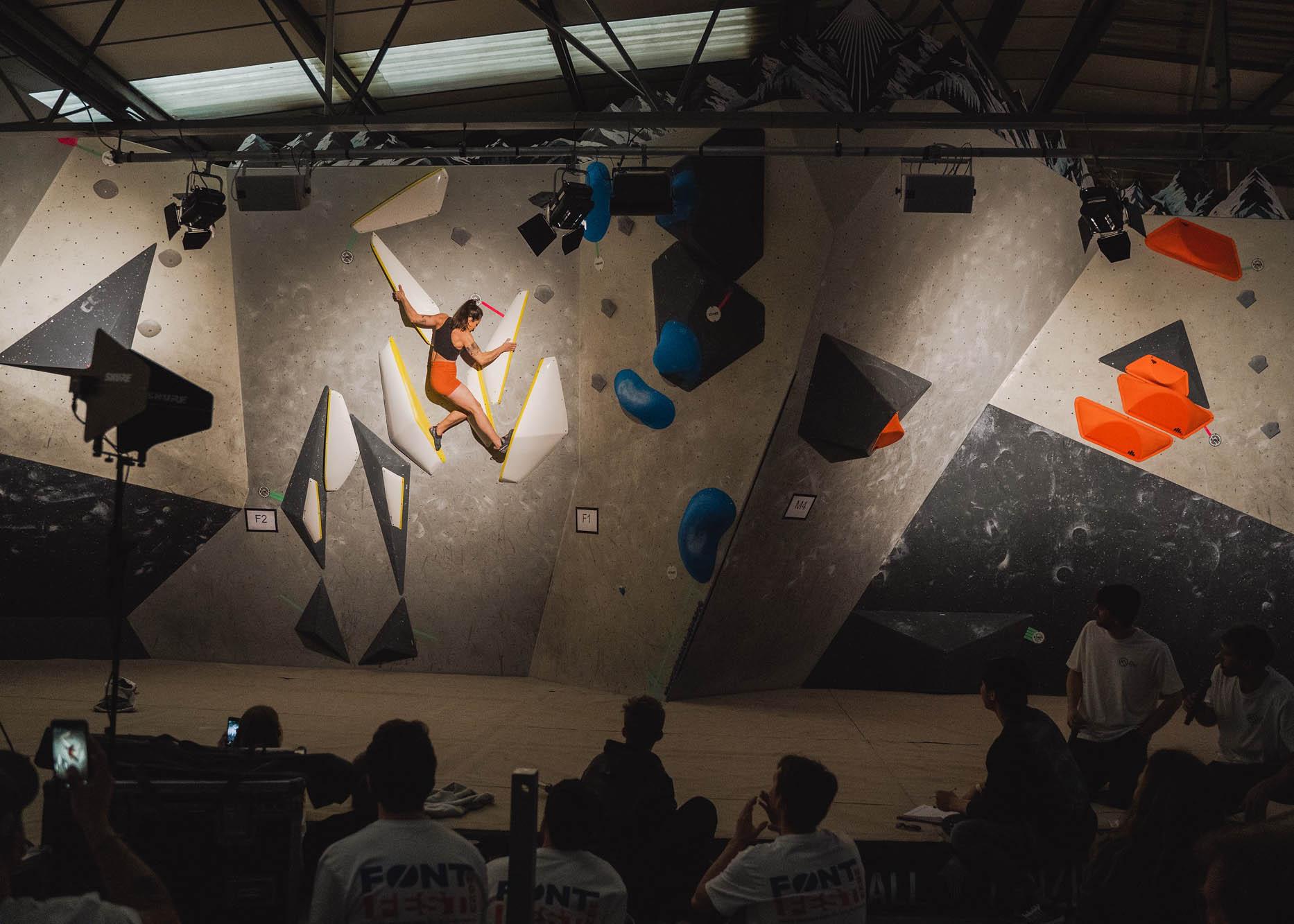
Yati: When you graduated Wichita, did you know that you were going to be in rock climbing?
Dipika: Absolutely not. I’m only 30. In my teenage years I wanted to be a painter. Over time, I think I’ve still kept that artistic spirit for sure … that sort of changed into film. I did film at university. And then I found climbing around that time as well. But it was really when COVID happened. In those three months when everything was shut down I really came to the realization that the thing that I missed the most was climbing. At that time, I had been climbing regularly for about two years. Before that I mostly just worked in hospitality, because I finished my degree. And then I went traveling, which became the main focus. I lived in New Zealand for a bit. Then I lived in Australia for a bit. And my plan was to move back to the UK, move to London, and pursue film. But then COVID happened, and I realized that climbing wasn’t parallel to anything else. I wanted to become a part of that industry and try to share that with the world and the people around me anyway. I’ve been quite fortunate that for the last three years I’ve been working within the industry, based in London, learning a lot, learning about myself a lot.
Yati: Can you share a specific moment in your climbing journey that has left a lasting impact on you?
Dipika : There are so many. My climbing journey has left a lasting impact. A memorable moment would be when I was climbing outdoors properly for the first time in Switzerland. A group of four of us did the whole thing where we hiked, and we camped, and we climbed during the day. It really felt like a proper pilgrimage. It allowed me to reconnect with nature a lot as well. Outdoors you have to think about the conditions. Sometimes it rains a lot, in which case you can’t climb. But even just sort of walking around and seeing these boulders, looking at the climbing history behind that as well, I find all of that very, very inspiring. On the last day of this trip, two of my friends got a little bit injured. So then there were myself and another friend who were the only ones climbing that day. Both of us were working on two completely different problems on the other side of the forest. My friend came with me in the morning. He was spotting, so he was there to make sure that I wasn’t falling off really weirdly or anything. Because obviously there’s no ropes or harnesses that you’re climbing on. With his support and with the sound of the forest I managed to finish this climb. And standing on top of it, that was a really beautiful moment. And then in the evening, we went to see what he was trying. Even though he wasn’t able to complete that trip, just to be there for each other. I think that really sort of solidified our friendship a lot. It just fills me with a lot of joy knowing that even though climbing and especially bouldering is such an individual sport, you can still find those moments when you can help each other in some way and share in each other’s successes. Community is a huge part. So all of my favorite memories are definitely with people.
Yati : Even though times are changing, as a woman representing the outdoor industry in the west which primarily remains male-dominated, what challenges have you encountered? How do you see the industry evolving in terms of inclusivity?
Dipika : That’s quite important. When I was just climbing recreationally, I never really thought of myself as being an outsider. This is how welcoming I felt the industry was that I never felt, “Oh, I’m a woman of color who’s trying this.” However, ever since I started working in the industry I’ve realized the importance of representation a lot more. And especially someone working in the route-setting field, which is creating different climbs. But route-setting is especially very highly white male-dominated in the UK. And it has been quite interesting for the last year and a half trying to become a part of it. As inclusive as the community is, whether people realize it or not, there is still an element of gatekeeping – people trying to hold onto the way that it used to be 10 years ago when it was a completely different sport. There weren’t that many gyms around. There weren’t as many opportunities for people to become route-setters. My career didn’t really exist as a viable option 10 years ago. Outwardly there isn’t really anything stopping anyone in becoming a part of the industry, no matter their background. However, because there’s a lack of representation currently, it’s just natural that people who don’t really see themselves being represented maybe don’t feel like they belong. It’s a conversation that myself and a few other people who are somewhat new to the industry have been trying to have.
I hosted a session in the middle of this year that invited 50 or so route-setters from around London and south of the UK that I personally knew to join this conversation. We got a decent turnout of maybe 20 people representing various gyms. I would like to see a change in the industry for people to admit that there is a lack of representation, considering when you look at the percentage of people who climb who are women and from diverse backgrounds. That is not represented at all in the people who are working within the industry. Acceptance is a huge part, and diversity is very, very important. I definitely see a slight shift happening. At the beginning of this year, I thought, you know, I’ve been learning this trade for the last year and a half, and I would like to step out of my comfort zone, to offer myself as a freelancer to set up at various other gyms. I think I was just expressing a bit of apprehension, a little bit of fear as to what if I don’t get enough work. And one of my colleagues made an offhand comment, “Oh, you’re a woman. You’ll be fine.” I don’t think he quite realized I don’t want to just be a token representation. I want to get jobs because I’m good at the job rather than because I happen to be a woman, and I’m needed to tick a box. So, I think there is an element in the industry right now where often you would only have one female route-setter in a team of four. There’s a lack of people who want to go into the industry because they don’t see themselves represented. So the more people like me sort of get into it, hopefully that will just start encouraging more people to take a step forward.
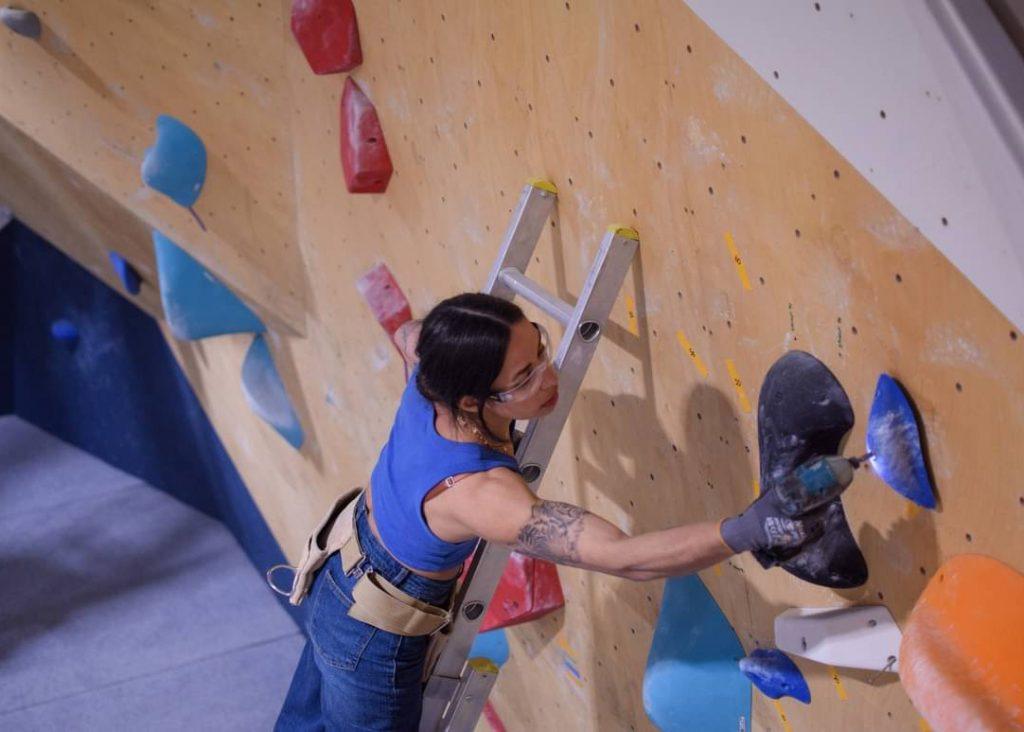
Yati: What do you find most fulfilling about being a climbing coach?
Dipika: I think because I love climbing so much, and that’s such a big part of my life. The feeling that you get when you accomplish something that you’ve been working on for even a day, or sometimes people come back to try their projects in the gym, you know, day after day. The feeling of getting to the top of it. When I see someone that I’ve been coaching get to the top of that project, it’s incredible.
I love sharing that journey and being a part of that. Seeing people try climbing for the first time, even if I haven’t directly been a part of their coaching journey, and then seeing them get better and better and more excited and then bring their friends in and their friends bring their friends in and slowly seeing the community build. I can see the joy in their faces and how much it means to them. It’s very fulfilling and super nice.
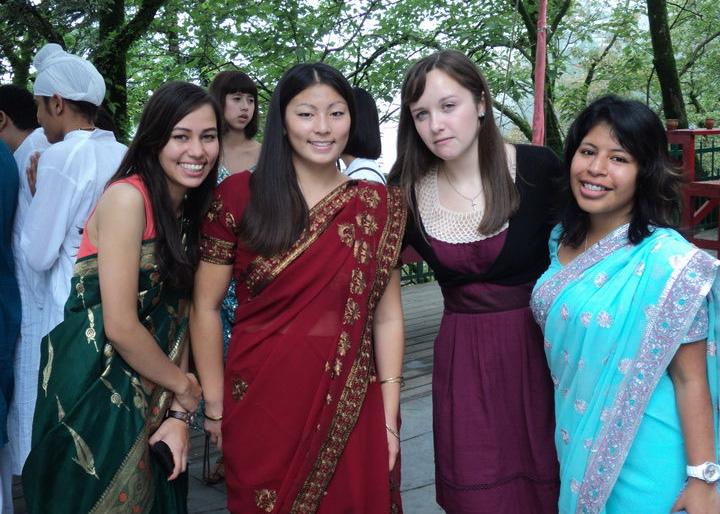
Yati: What advice would you give to a new student or if you could go back and give advice to your younger self at Woodstock?
Dipika: To my younger self I think be kinder to yourself. I think we tend to put a lot of pressure on ourselves, and I still sometimes do to constantly be achieving something. But when I came back to Woodstock and chatted with students, I saw myself from a different perspective. I think to not be as hard on yourself and enjoy more the space that Mussoorie and Woodstock have. Woodstock is such a cool place that has a lot to offer. It’s also really important to just enjoy the moment and not be too hard on yourself. When I was at Woodstock I felt like I didn’t fit in. I tried a lot to try and fit in, which I guess is expected when you’re 15 or 16. But I understand that at Woodstock you’ve got people from all around the world, right? No one really fits in. Everyone is quite unique and brings their own perspective and life experiences to it. Just be kinder to yourself.
Yati: Could you please tell us about your interaction with Woodstock students? And what key lessons or insights do you hope for them to take away from this?
Dipika: Be kind. I think it’s been amazing. It’s been really, really cool to be back at the school to share my love and knowledge of climbing with students. Overall the feedback that I’ve had from the teachers and some students as well was that they want to climb a bit more. Also hopefully they can understand the value of pursuing something out of the love for it rather than just pursuing the very traditional idea of success. I’m hoping that is something students take on. It’s been amazing to chat with so many students during the lessons as well. Some students have come up to me to talk a little bit more about how I got into climbing, or career trajectories, or my experience at Woodstock. It’s been really, really lovely that they’re not too intimidated or as if I’ll be intimidating. It’s been amazing to see how beautiful the Woodstock community is – the students do so much and are so talented. It really makes me feel very proud to have been a student of the school and to also return as well and be a part of the student experience.
Interview by Yati, Class of 2025






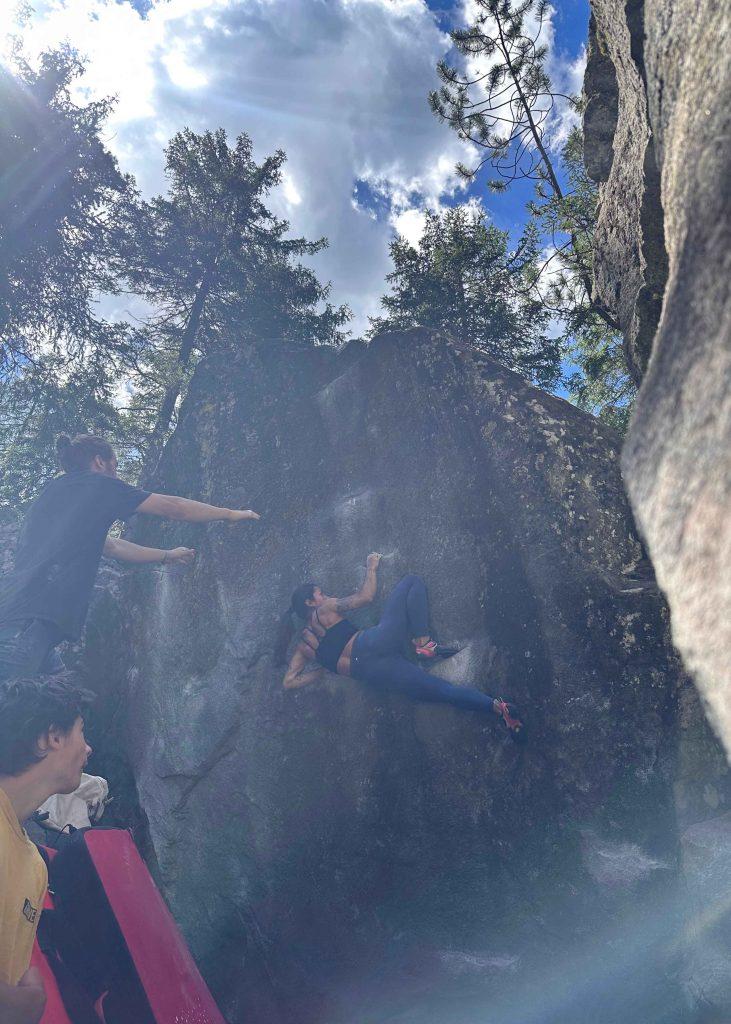
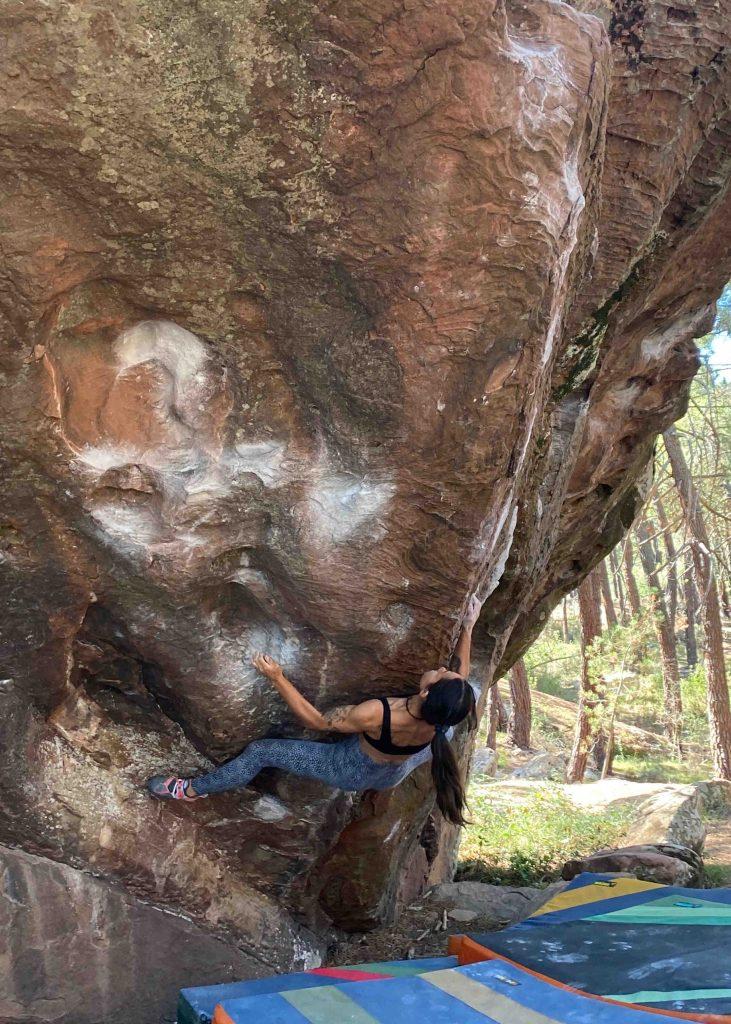
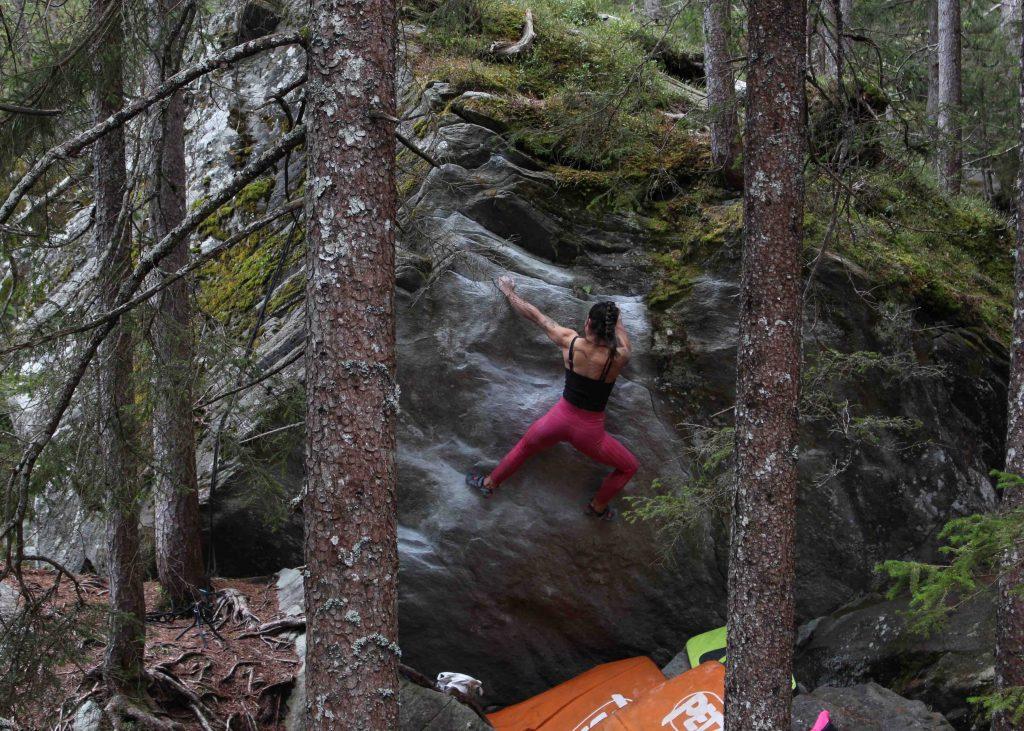
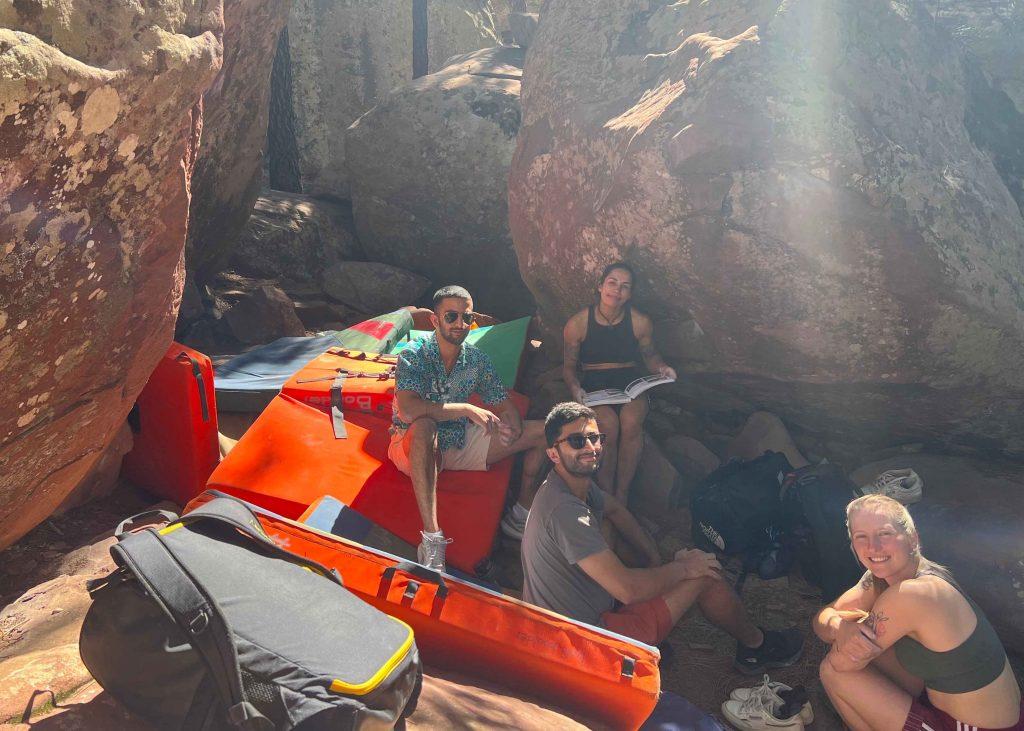
No Comments